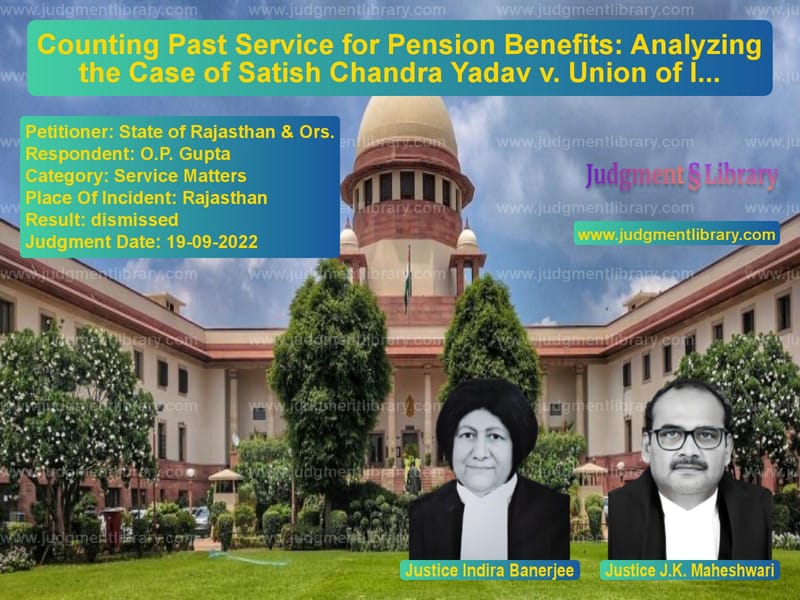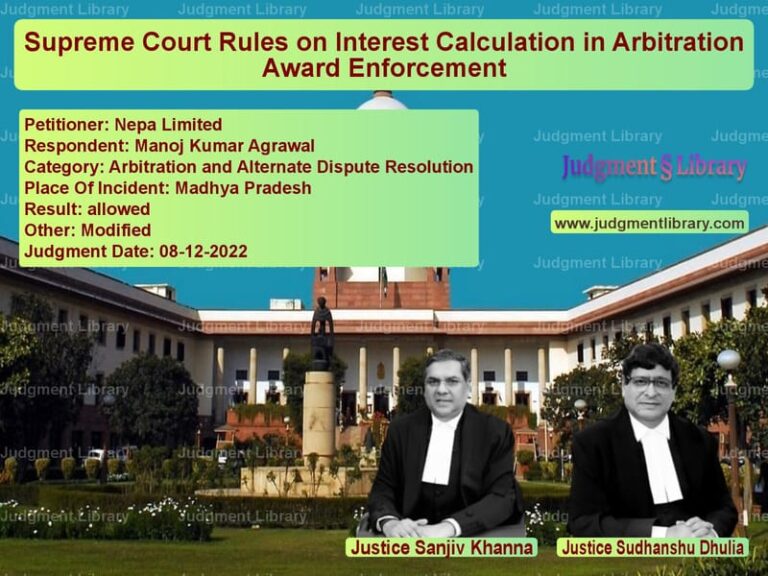Counting Past Service for Pension Benefits: Analyzing the Case of Satish Chandra Yadav v. Union of India
The case concerns the dispute between Satish Chandra Yadav, a former employee of the Rajasthan Agriculture Engineering Board, and the State of Rajasthan regarding the counting of past service for pension benefits. The appellant, who served in the Rajasthan Agriculture Engineering Board and later the Rajasthan State Agro Industry Corporation, argued that the period of service before his resignation should be counted for the purpose of pension calculation. The State of Rajasthan contested this, arguing that the service should not be counted. This case was decided by the Supreme Court, which dismissed the Special Leave Petition filed by the State of Rajasthan. The judgment clarified several aspects of pension rules and service counting, with particular emphasis on Rule 25(2) of the Rajasthan Civil Services (Pension) Rules, 1996. This blog explores the arguments, reasoning, and final decision in detail.
Background of the Case
Satish Chandra Yadav, initially appointed as Assistant Charge Man in the Rajasthan Agriculture Engineering Board, later served in the Rajasthan State Agro Industry Corporation after the merger of the Engineering Board into the Corporation. In 1977, Yadav was selected as Assistant Director (Agro-Industries) through the Rajasthan Public Service Commission (RPSC) and subsequently joined the Department of Industries, Rajasthan. He retired in 2003 after serving as the Additional Director of Industries. However, during the calculation of his pension, the period of service from 13th January 1967 to 12th April 1977, when he worked with the Agriculture Engineering Board and Agro Industry Corporation, was not considered. The appellant made repeated representations, but his request was not granted. This led him to file a writ petition, which was allowed by the Single Bench of the Rajasthan High Court. The State of Rajasthan filed an appeal, which was dismissed by the Division Bench. The petitioners then moved the Supreme Court with a Special Leave Petition.
Petitioner’s Arguments
The appellant, Satish Chandra Yadav, put forth several arguments in favor of counting his previous service for pension benefits:
- Validity of Past Service: The appellant argued that his service with the Rajasthan Agriculture Engineering Board and the Rajasthan State Agro Industry Corporation was pensionable. He pointed out that the period of his employment should be counted for pension purposes as he had worked continuously and under the same government, albeit under different departments.
- Rule 25(2) of the Rajasthan Pension Rules: The appellant emphasized Rule 25(2) of the Rajasthan Civil Services (Pension) Rules, 1996, which allows the counting of past service in case of resignation, provided the resignation was taken with proper permission to take up another government appointment. He contended that since his resignation was granted and he was duly appointed in the Department of Industries, his past service should not be forfeited.
- No Need for Proof of Permission: The appellant argued that it should be presumed that he had taken proper permission before his resignation. Given that the government appointment was obtained through the RPSC, he contended that the process itself demonstrated that the required permissions were obtained.
- Impact of Delay: The appellant acknowledged the delay in filing the writ petition but argued that the issue at hand, denial of pension benefits, was a continuing wrong, which justified judicial intervention even after a lapse of time.
- Equity and Fairness: The appellant contended that it would be inequitable and unfair to deny the counting of his previous service. He emphasized that pension is a life-long benefit and the denial of his rightful pension was a continuing injustice.
Respondent’s Arguments
The respondent, the State of Rajasthan, made the following counter-arguments:
- Interpretation of Rule 25(2): The respondent argued that Rule 25(2) of the Rajasthan Civil Services (Pension) Rules was misinterpreted by the High Court. They contended that the appellant’s resignation from the Rajasthan State Agro Industry Corporation led to forfeiture of his past service, as it was not in line with the provisions of the rule, which requires proper permission and continuity in service.
- Non-Applicability of Pension Rules to Resigned Employees: The respondent pointed out that the appellant’s resignation from the Rajasthan State Agro Industry Corporation was a voluntary one, and therefore, the past service could not be counted for pension purposes. They emphasized that such resignation from service automatically leads to the forfeiture of past service, as per the general principles of employment law.
- Delay in Filing the Petition: The respondent argued that the appellant’s petition was filed six years after his retirement. They contended that the delay in seeking relief was substantial, and as per the principles of equity, this should preclude the appellant from receiving relief at such a delayed stage.
- Inconsequential Past Service: The respondent further contended that the appellant’s previous employment with the Rajasthan Agriculture Engineering Board and the Rajasthan State Agro Industry Corporation was inconsequential to his current position. They argued that the service in these entities was not directly relevant to his subsequent position in the Department of Industries and should not be considered for pension calculation.
The Court’s Reasoning
The Supreme Court, after reviewing the facts and the legal arguments, made the following observations:
- Interpretation of Rule 25(2): The Court carefully examined Rule 25(2) of the Rajasthan Civil Services (Pension) Rules, 1996, and held that the rule permits the counting of past service if the resignation is submitted with proper permission to take up another government appointment. The Court noted that the appellant had resigned from the Rajasthan State Agro Industry Corporation to join the Department of Industries in a government position, which satisfied the requirements of the rule.
- Acquisition of Proper Permission: The Court found that it could reasonably be presumed that the appellant had obtained proper permission before resigning, especially since his subsequent appointment was obtained through a government procedure. The Court held that the respondent’s argument regarding the lack of proof of permission was unfounded, as the RPSC’s involvement implied proper channels were followed.
- Pension as a Continuing Benefit: The Court emphasized that pension is a continuing benefit and the denial of pension due to a technicality like resignation was unreasonable. The Court highlighted that pension should not be denied arbitrarily and that it is an entitlement that should not be forfeited unless explicitly stipulated under the rules.
- Delay in Filing Petition: While the Court acknowledged the delay in filing the petition, it noted that the issue of pension is a matter of continuing wrong, and the appellant’s right to receive pension could not be extinguished by delay. The Court emphasized that laws of limitation do not strictly apply to writ petitions under Article 226 of the Constitution of India, and the Court has discretion in such matters.
- Equitable Relief: The Court applied equitable principles and noted that the appellant had served the government for a long period and had retired after a substantial career. Denying him pension for his earlier service would amount to unjust enrichment by the State.
The Court’s Decision
The Supreme Court, agreeing with the High Court’s judgment, made the following orders:
- Dismissal of the Special Leave Petition: The Court dismissed the Special Leave Petition filed by the State of Rajasthan, upholding the High Court’s decision to count the appellant’s previous service for pension purposes.
- Calculation of Pension: The Court directed the State of Rajasthan to calculate the appellant’s pension, including the service period from 13th January 1967 to 12th April 1977, and release all due pension and retiral benefits along with arrears, with interest at the rate of 9% per annum.
Conclusion
This case underscores the importance of interpreting pension rules in a manner that ensures fairness to government employees. The Supreme Court’s decision to grant the appellant’s pension reflects the need for equitable relief, especially when pension is a life-long benefit that is integral to an employee’s post-retirement security. The case also highlights that, while resignation can generally lead to the forfeiture of past service, exceptions exist where proper permissions have been granted for continuing service under the government.
Petitioner Name: State of Rajasthan & Ors..Respondent Name: O.P. Gupta.Judgment By: Justice Indira Banerjee, Justice J.K. Maheshwari.Place Of Incident: Rajasthan.Judgment Date: 19-09-2022.
Don’t miss out on the full details! Download the complete judgment in PDF format below and gain valuable insights instantly!
Download Judgment: state-of-rajasthan-&-vs-o.p.-gupta-supreme-court-of-india-judgment-dated-19-09-2022.pdf
Directly Download Judgment: Directly download this Judgment
See all petitions in Pension and Gratuity
See all petitions in Public Sector Employees
See all petitions in Employment Disputes
See all petitions in Termination Cases
See all petitions in Judgment by Indira Banerjee
See all petitions in Judgment by J.K. Maheshwari
See all petitions in dismissed
See all petitions in supreme court of India judgments September 2022
See all petitions in 2022 judgments
See all posts in Service Matters Category
See all allowed petitions in Service Matters Category
See all Dismissed petitions in Service Matters Category
See all partially allowed petitions in Service Matters Category







